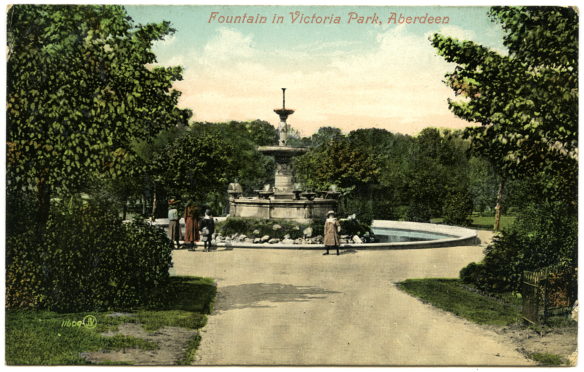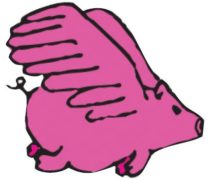J Fergus Lamont, arts correspondent and author of ‘The Mask – From Bridge Street gentleman’s club to national necessity’
Oh blessed relief! After a masked attendance at my local barber this week, I walked giddily around the town centre for the first time in several months, feeling stunned and lightheaded.
This was partly because my head was unencumbered by the great tousle of hair that had just been removed. But it was also because of the artistic outpouring that has occurred since last I perambulated in Aberdeen. You may not have heard as it has had little or no publicity, but local art collective “The Aberdeen City Council’ has been working overtime with powerful new street art installations.
Union Street itself is transformed! Now all traffic is confined to the margins where cars buzz in diversionary circles like angry flies, and an avenue of potted plants sits proud down the centre of the road. This green leyline is of course a powerful metaphor for the passing of history – Aberdeen’s former glories as City in Bloom champion – and a poignant reminder of the natural life that thrived here before Union Street was built. Life which has since been only glimpsed erupting from the roofs and gutters of neglected buildings, but which is now given formal leave to return in little black council-branded pots.
Along the streets, I also beheld a large number of identical wooden pavement sculptures, shaped simultaneously as benches and pianos. Benches, to remind us of the need for a stunned sitdown to take stock of current events, but also unplayable pianos, reminding us of the music and song silenced by the pandemic. The unvarnished wood of these bench-piano hybrids shall no doubt soon be the canvas and page upon which street artists and urban poets shall paint and write in the coming weeks.
Further down the road, outside another city hostelry, I marvelled at a large tent of polythene proudly squatting in the now-unused bus lane, and labelled “The Grill”. Looming before me like the crime scene at the start of an episode of Taggart, this piece stands proud in defiance of its surroundings, as if taunting all the other public houses who don’t have a massive tent outside their own doors. It’s uniqueness itself makes it all the more powerful.
Truly, the Aberdeen City Council has taken the national mood of confusion, mixed messages and uncertainty and reflected it in all of these superb art installations. I was so impressed, I stood by the Rosemount Place road-centre car park and shouted “huzzah”, until I was chased from the area by a selection of “angry small business shopkeepers”.
These were presumably actors taking advantage of the resumption of open-air performance, but had a ferocity and commitment to their roles which surprised and delighted me. As I ran, I stumbled into one of the orange and white traffic cones that have been drilled into the road at crotch height.
“Oh dear, right into the bollards,” said a sympathetic passerby. I wept.
Ron Cluny, official council spokesman
Many people have lost their jobs in the current coronavirus crisis. However, when I saw Matt Hancock look the nation in the eye and, in direct contradiction of the chief scientific officer, tell us that the UK’s lockdown began on March 16, not a week later, I realised that not just my job, but my entire trade, had been made redundant.
As I am an official spokesman for a local authority – or spin doctor, as some would have it – many of you will think that is a very good thing. We are not an especially beloved group of people. Some have said that we exist only to make bankers, lawyers and people who steal lead off the roofs of churches feel better about themselves. People say that we are pathological liars, strangers to the truth, but that is a mistake.
Because a good spin doctor never lies. We simply try to make the truth hard to discover, or to distract people from working out its full significance. That may not be the most honourable thing to do. But the reason we do that is because in the past we have always recognised that truth matters. Recognised that lying your way out of trouble, although tempting, was taboo – and that a politician caught doing so would have to resign. Our elaborate dance with the truth was in a sense a sincere tribute to its overriding importance.
Even Dominic Cummings paid lip service to the importance of the truth by doing us the courtesy of coming up with an elaborate justification for why he had been caught breaking his own lockdown rules. And who wasn’t entertained by the story of the Barnard Castle eye test, a tale so tall that it could cross the Atlantic and make a good living playing basketball.
Matt Hancock’s statement, on the other hand, is a horse of a very different colour. It’s not a bit unlikely, it’s not a disingenuous manipulation of statistics. It is a fib that can be instantly disproved by even the most cursory of investigations – an unabashed whopper told in an attempt to deceive the nation as to the swiftness of the government’s response in the secure knowledge that he will face no repercussions from his political masters for doing so.
Remember the day that British politics turned its back on the truth: July 16 2020. Although of course, Matt Hancock will tell you it happened a week earlier.
Watch performances by The Flying Pigs on their YouTube Channel.

